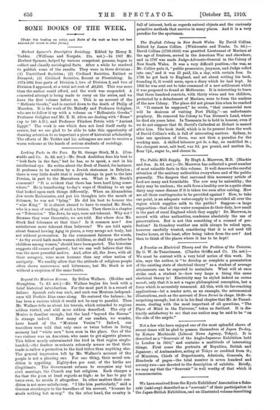The English Colony in New South Wales. By David Collins.
Edited by James Collier. (Whitcombe and Tombs. 7s. Bd.)- David Collins (1756-1810) was gazetted Lieutenant of Marines at the age of fourteen, served in the American War and elsewhere, and in 1787 was made Judge-Advocate-General in the Colony of New South Wales. It was a very difficult position,—he was, as Mr. Collier puts it, "public prosecutor, juryman, and Judge rolled into one," and it was ill paid, 15s. a day, with certain fees. In 1796 ho got back to England, and set about writing his book, founding it, it would seem, upon a diary which he had kept. In 1803 he was sent out to take command of a new settlement which it was proposed to found at Melbourne. It is interesting to learn that three hundred convicts, with thirty wives and ten children, protected by a detachment of Marines, were to form the nucleus of the new Colony. The place did not please him when he reached it. "It cannot be supposed," he wrote, "that commercial men will be desirous of visiting Port Philip,"—an unfortunate prophecy. He removed his Colony to Van Diemen's Land, where he died six years later. In Tasmania he is held in honour, even if we do not suppose that St. David's Cathedral at Hobart is named after him. The book itself, which is in its present form the work of David Collins's wife, is full of interesting matters. Sydney, to take one specimen of them, was not then a paradise for the working man. A skilled labourer got 5s. a day, an unskilled 3s. ; the cheapest meat, salt beef, was 81. per pound, and mutton 2s., flour 74d., sugar is., and cheese 3s.














































 Previous page
Previous page